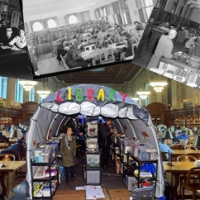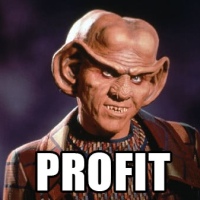Neoliberalism Can Suck It
Good AROTE, faithful crewmembers. Since the captains of this sinking ship live in New York City, we will probably have a lot to say about the state of things here. Let me apologize ahead of time to those for whom New York is not the center of the universe.
While not nearly as dramatic as the teachers’ strike in Chicago last year (would that our teachers might follow that lead), NYC is currently in the grips of a school bus drivers’ strike. Those who’ve read my scribblings elsewhere know that I love a good strike.
Unlike in suburban and rural school districts, kids who live in dense urban areas like NYC mostly do not all ride school busses to school. Lots of NYC’s students take public transit, city subways and busses, and depending on the student’s age and the distance they live from their school, some or all of the cost is subsidized by the school system. School busses are made available, though, to students who meet certain criteria such as having an Individualized Education Program that indicates its necessity (“special ed,” colloquially), or having specific combinations of age and distance. What this means is that students taking school busses in New York City are mostly the youngest or have special needs that make it very challenging for them to take public transportation. Molly Knefel lays it all down here.
But what do striking bus drivers have to do with libraries?
Here in New York, our mayor is a rich white man. A very, very, VERY rich which man. Perpetually on his agenda is “reforming” “failing” schools. What this has meant in practice is closing neighborhood schools where students are performing poorly; pushing charter schools; co-locating schools in the same facilities, yet not mingling resources or student bodies; fighting unions tooth and nail, including the bus drivers; and never-minding racial and economic segregation. Neoliberalism at its finest, basically. It also means that he has no idea at all what the lives of most of his constituents are like.
He’s the same fellow, by the way, who has a lot to do with the New York Public Library and it’s recent plans to reorganize (read: completely FUBAR) the main branch, as well as proposing budget cuts to the NYPL, QPL, and BPL annually. Somehow, though, he still gets invited to all the big fundraising galas.
But this isn’t just a New York City problem or a Bloomberg problem. It is, as I said, the crux of neoliberalism, as well as its close cousin fiscal conservatism. Both are really just convenient tools of backlash against all the groups that have been working towards liberation over the last century and a half or so.
No, really, stay with me here.
Once upon a time, municipalities around the US liked to build libraries and schools and stuff. The social safety net provided some stuff that we would hardly dream of demanding now. Higher education cost a lot less, whether public of private, and was free in a lot more places. *coughCUNYcough*
The problem with all this civic good, though, is that access was highly restricted. Women were barred from, or at best had highly restricted access to, most elite colleges and universities, nor could they get a seat in a major symphonic orchestra before the institution of blind auditions. Black and brown folks were subject to segregated, separate and unequal public facilities, whether de jure or de facto. The segment of society that was able to fully enjoy all these public benefits was small, and they fiercely guarded that privilege. So, the fabulous library systems of yore, such as those in Shane Hand’s recent Progressive Librarian article, often catered only to white patrons, for example. The white men who decided on the budgets of such institutions were happy to fund them while they say only themselves reflected back by the institutions’ users.
But time passed, and by hook or by crook, Black folks, Native Americans, women, queers, people with disabilities, and others forced their way into public life. Without legal and overt means by which to deny the oppressed their inclusion as full members of the commons, the oppressor classes found sneakier ways to keep out the unwashed masses.
Instead of Jim Crow we have stop-and-frisk, sentencing minimums, the War on Drugs, and the prison-industrial complex incentivizing mass incarceration of mostly poor Black and brown men. Unlike most developed countries, we have no laws mandating maternity leave; precious little support for child care or elder care; and, as I write, the Violence Against Women Act is, for the first time since it was enacted, in serious danger of not being renewed. The cost of tuition has risen sharply over the last couple decades, including at public universities that used to receive much more state funding, while the student loan business has boomed. CUNY has been charging tuition long enough that many current NYC residents don’t know it was once free, and Cooper Union’s administration is trying to figure out how they can start charging, despite heavy opposition from students, faculty, and alumni, as well as some pesky clauses in their foundational documents. The Americans with Disabilities Act leaves inaccessible loopholes allover the place, and hell will freeze over before any facility goes beyond the law’s minimum requirements. Social Security is under perennial threat of being privatized by the right; the “left” (such as it is) passed health care reform that amounted to a give-away to the insurance industry. Individuals and their bootstraps are tasked with fixing what are actually systemic problems, and somehow the all-powerful market is supposed to work this all out for us. But as Melissa McEwan says, the invisible hand of the market belongs to a thief.
But if we can point to that invisible hand, the man behind the curtain, then it isn’t our fault. That’s just how things are. Structural inequality? Lalala, I can’t hear you.
Let me be more clear: libraries and other commonly held public institutions are allowed to close, under the guise of fiscal responsibility, because those people are now allowed to access them. And those people aren’t allowed to have nice things.
It is, to quote my mother, “cutting off your nose to spite your face.” It is more important to the privileged oppressor classes that the oppressed classes be denied, than for public institutions to exist that the oppressor classes might themselves make use of. It was great to have children’s libraries staffed by knowledgable librarians and filled with all the latest material — when the only kids in there were white. A reading room in a public research library is a fine thing — when your researchers were be-tweeded men thinking manly thoughts about manly subjects. High performing, resource-rich magnet schools for talented youth are a good idea until… Oh wait. Those still almost exclusively serve wealthy, white students. Carry on, Bloomy.
There we have it. The power brokers are still the same as they ever were, and they’ll be damned before thy have to let anyone else have even the smallest toehold. And through fiscal responsibility, reorganization, modernization, globalization, privatization, and so on, they throw up a shield of plausible deniability. Don’t think for a second, though, that exclusion is a bug; it’s always a feature. They’ll never (well, almost never, they do occasionally get caught with their pants down) come right out and say it, but where once there was legal discrimination, there is now a backlash of micro-aggressions that build up to amount to the same thing. And that means closed libraries and schools, union busting, redistribution of resources up the ladder, untenable loans and debt, and re-marginalization of demographics that were only just exploring their membership in the commons.











This is an exquisite article. It’s refreshing to read someone who can see through all the political smoke-screens and ideological facades and present a real interpretation on/analysis of issues such as these. Neoliberalism and privatization are two areas which I wish were discussed more (since they contain, as you discussed, a multitude of social justice and civil rights repercussions), but the topics certainly aren’t popular. Thank you for the excellent writing.
Pingback: Free Cooper Union | LibrarianShipwreck